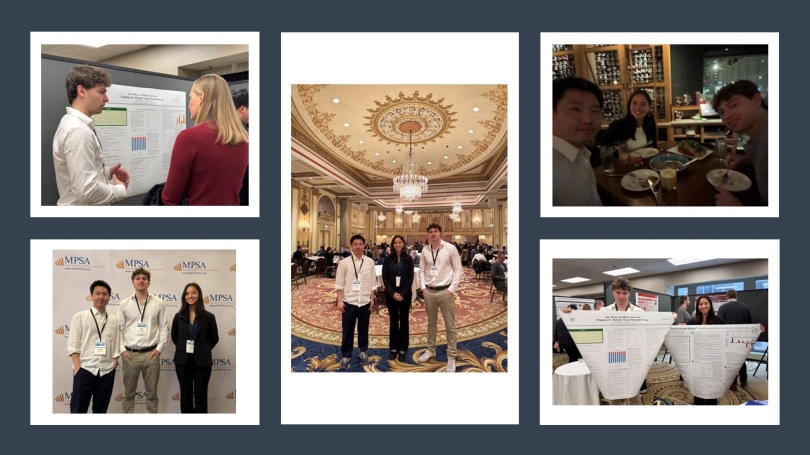
- Undergraduate
- Research
- About the Program
- News & Events
- People
Back to Top Nav
Back to Top Nav
Back to Top Nav
Back to Top Nav
The 82nd Annual Conference of the Midwest Political Science Association (MPSA) took place April 2-6, in Chicago, IL. The event brought together political scientists, scholars, and practitioners from around the world to share insights, debate pressing issues, and present cutting-edge research. Among the participants were Will Ermarth `25 and Maya Magee `25, both of whom are majoring in Quantitative Social Science (QSS) and writing honors theses under the supervision of Professor Herbert Chang.
At the Midwest meeting, Will presented his thesis, "An analysis of regional attitudes toward renewable energy," at a session for Energy and Environmental Policy. Will's work combines large scale social media data from Instagram and an experiment using renewable energy misinformation. After scraping posts about solar, wind, nuclear, hydro, and geothermal power, Will investigates the effects of misinformation on people's willingness to invest in renewable energy. He defended his thesis on May 7.
Maya presented her thesis, titled "Does AI exhibit human biases? LLM assessment of social media content in the 2024 US elections," at a session on Emerging Technology and Political Science. Maya compares survey results fielded during the 2024 United States election and simulates how information spreads on social networks. She defended her thesis on May 6.
Also attending the Midwest conference were a number of Dartmouth faculty members who serve on the QSS Steering Committee. Professor of Government Brendan Nyhan served as a panelist on the roundtable, "U.S. Democracy and the Trump Administration," which had dozens of people in attendance, and as a panelist in an author-meets-critics discussion of Anti-Scientific Americans.
Professor Yusaku Horiuchi of the Department of Government presented, "To Compare or Not to Compare, That Is a Question in Conjoint Analysis," on a panel for experimental surveys. His work demonstrates how the number of profiles in a conjoint experiment influences respondents' choices.
Professor Mia Costa of the Department of Government presented a paper, "Partisanship and Self-Perceptions of Political Identity in the United States," which studies how gender, race, class, sexuality, and partisanship inform how Americans conceive of their own political identity. Professor Costa was also a co-author on a second paper, titled "Perceptions of Place and Candidates' Urban/Rural Roots in U.S. Politics," which was presented by Jayanth Uppaluri '24, a post-baccalaureate fellow in Government (this paper is co-authored by QSS affiliate Professor Charles Crabtree). In this paper, Uppaluri and his co-authors study the role of geographical stereotypes in candidate evaluations.
Professor Chang presented two papers. One of them, "Generative Memesis: AI mediates political information in the 2024 USA elections," is co-authored with seven Dartmouth students. This paper is one of the first studies to assess the impact of AI during the recent 2024 election. The second paper, led by QSS major and Hanlon Scholar Tracy Werner '26 and co-authored with Professor Horiuchi, traces the impact of US-skeptical misinformation on policy preferences during the 2024 Taiwanese elections.